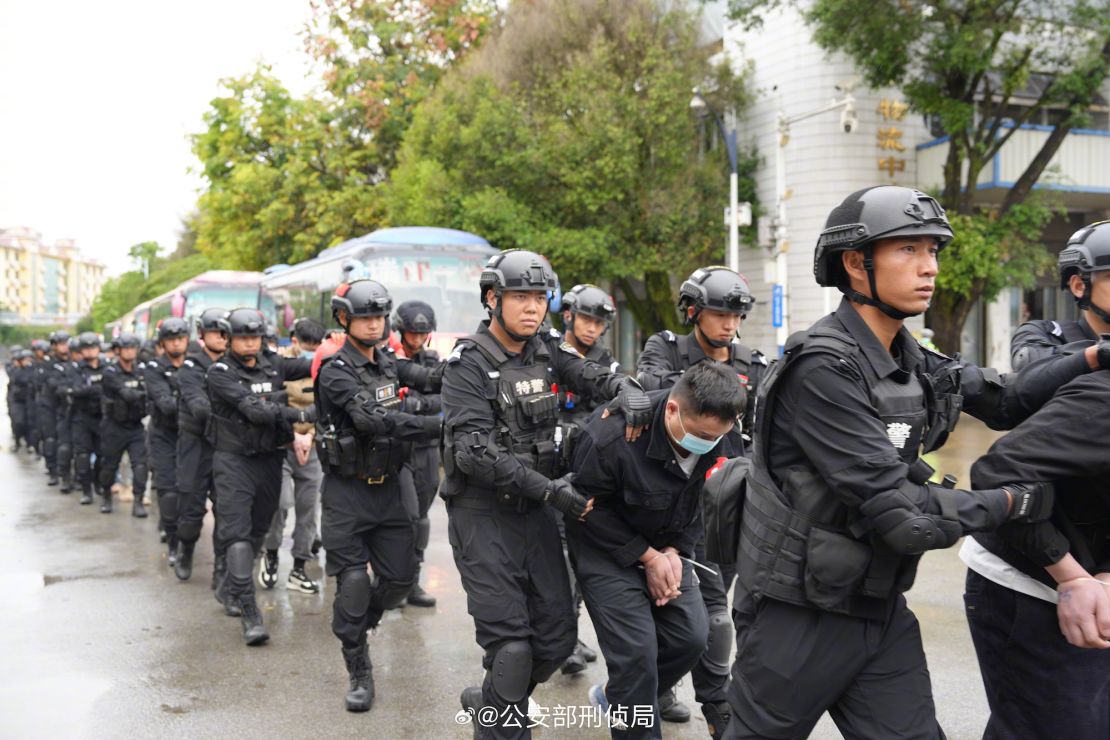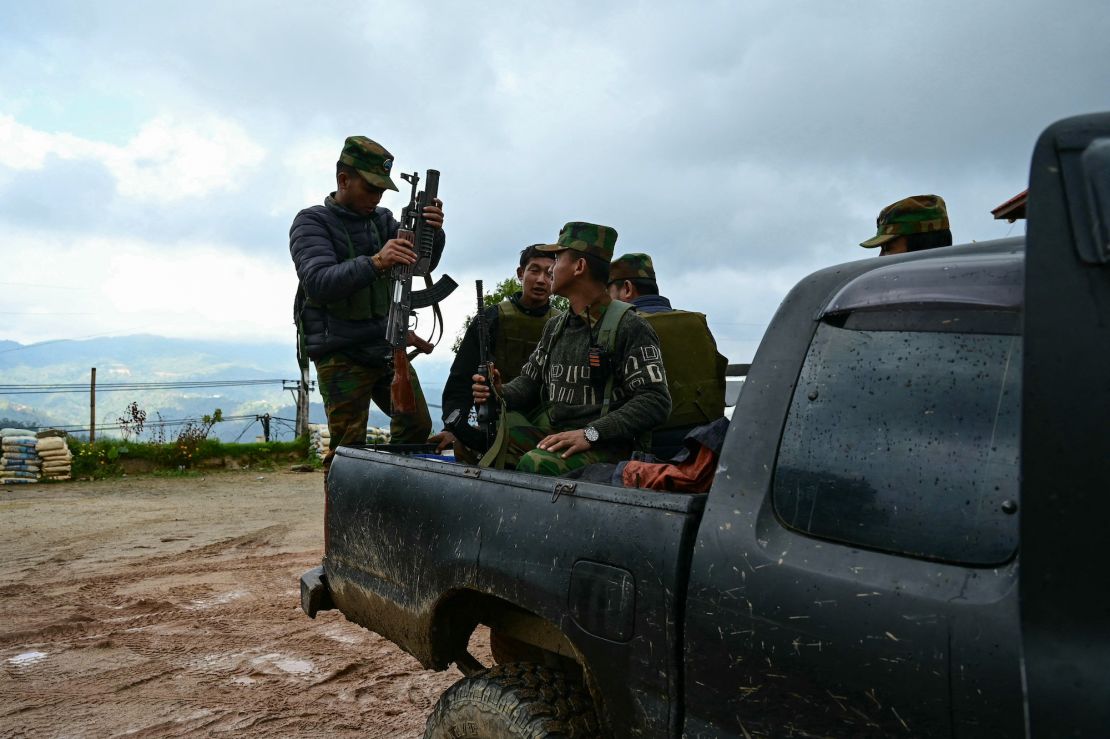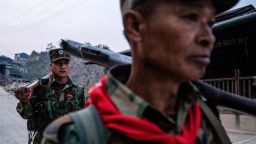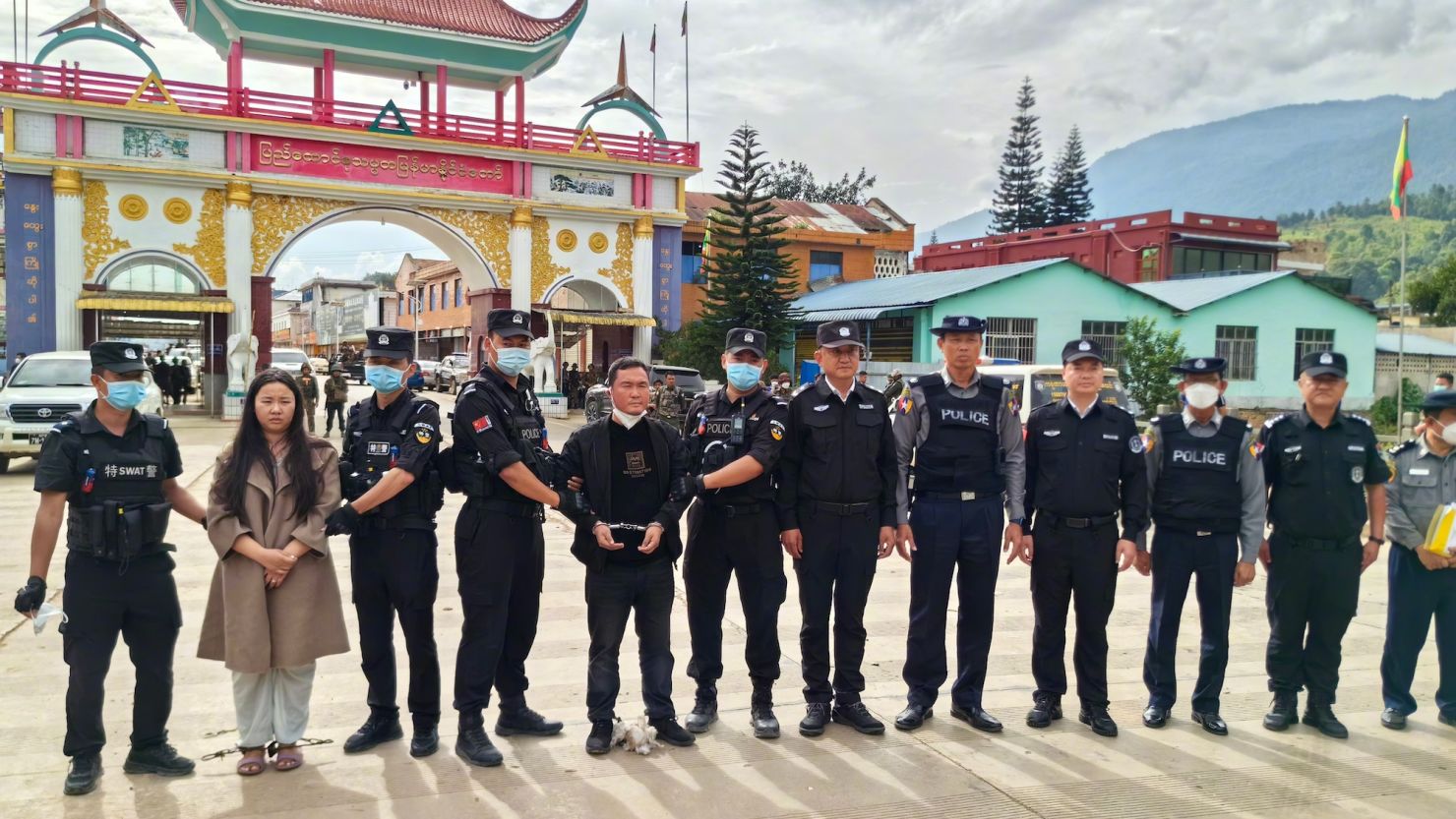
Image by Jesse Schoff.
A Badly Weakened Dictatorship
Myanmar’s (Burma) military dictatorship, which seized power in 2021, suddenly is vulnerable to attack from the hodgepodge resistance forces loosely aligned under a National Unity Government. These forces are of two kinds: ethnic minority armies, sometimes referred to as the Three Brotherhood Alliance, that have a long history of opposition to the military government, and pro-democracy groups backed by the NUG that have come together since the 2021 coup. (A publication of Myanmar journalists in exile in Thailand lists 30 armed groups in all, 10 of which are ethnic armies).
What makes the resistance so threatening to the military now is that the various armies are coordinating and becoming increasingly successful in the north and northeast, areas that border China as well as Thailand and India. The opposition has captured towns, seized arsenals, and obtained the surrender of some government units, most recently including an entire battalion. Thousands of people have fled the fighting, mainly into India.
The Myanmar junta has superior forces on the ground and in the air, yet a BBC report says: “After two and a half years of battling the armed uprising it provoked with its disastrous coup, the military is looking weak, and possibly beatable.” A Council on Foreign Relations study suggests that another coup by disgruntled army officers is even possible.
China’s Position
China seems to be playing both sides, no doubt aware of the security implications of backing just one.
On one hand, it has consistently supported the junta’s repression. The Myanmar leadership pretends that all is well in relations with China. It insists that ties are strong and that the strategic partnership is firm. The latest evidence is a port visit November 27 by three Chinese vessels, including a destroyer, in preparation for joint naval maneuvers.
Behind the scenes, however, reports indicate displeasure within the junta over China’s relations with the rebel groups, in particular sales of weapons to those groups. That displeasure led to a first-ever anti-China demonstration outside the Chinese embassy in Yangon on Nov. 17.
China’s foreign ministry spokesman had to issue a formal statement reassuring the protesters that China never interferes in Myanmar’s internal affairs.
Chinese authorities are indeed in close touch with the rebelling ethnic groups, which have promised to protect Chinese investments in areas the groups control. The northeast border area is the site of criminal activity—drug trafficking and cypberscam operations—that concerns China because of its impact on Chinese nationals and the capacity for border unrest.
Beijing has neither condemned the opposition forces nor endorsed the junta’s efforts to quash them. According to a report by the US Institute of Peace (USIP), “Beijing almost certainly approved the offensive after the junta generals ignored its appeals to crack down on lucrative crime centers along the border that pretty on China nationals.”
That has probably gotten the generals’ attention: The junta is now reporting that China is brokering peace talks between the main armed opposition group and the government.
After Victory: The Challenges Ahead
The military successes of the resistance forces beg the question, What might Myanmar look like if they win—that is, force the collapse of the junta?
The USIP study is, somewhat surprisingly, optimistic. Whereas some specialists might predict a fragmentation of the resistance along ethnic and political lines, one of the USIP study’s main findings is that:
“most [resistance fighters] are motivated primarily by a desire to protect communities from the rampaging army and to achieve a new political and social paradigm. Many resistance fighters . . . have roots in communities they serve. Likewise, the core ethnic resistance organizations [EROs] started as social movements decades ago, not armed groups, and continue to serve their own communities.”
As for the potential to overcome differences and build a new Myanmar, the USIP study finds:
“Achieving a new political arrangement will not be straightforward and will likely require years of national dialogue. But USIP research shows that the movement has already made meaningful progress toward national reconciliation and building a shared vision. The various forms of collaboration between EROs and Bamar communities on military operations, social service provision and humanitarian response further demonstrate growing solidarity.”
Two other things the movement will have to accomplish: diverting farmers from opium production, and reversing the country’s stagnant growth. The UN Office on Drugs and Crime has just announced that Myanmar has surpassed Afghanistan as the world leader in opium production.
Rising insecurity has apparently contributed to increased resort to poppy growing. It has also contributed to greatly reduced trade, foreign investment, inflation, and displacement of about 2.5 million people, according to the World Bank. The Bank projects overall economic growth for Myanmar of one percent.
Can a highly diverse resistance movement come together to build a just and equitable society? From a distance it may seem that the odds are against, but in the particular case of Myanmar, release from the overwhelming weight of the military may be the key ingredient in building a national consensus for democratic rule and social justice.
Myanmar Supreme Court rejects ousted leader Suu Kyi’s special appeal in bribery conviction
THE ASSOCIATED PRESS
December 19, 2023

A Myanmar protester residing in Japan uses a flag with an image of deposed Myanmar leader Aung San Suu Kyi during a rally to mark the second anniversary of Myanmar’s 2021 military coup, outside the Embassy of Myanmar in Tokyo, Japan February 1, 2023.
BANGKOK--Myanmar’s Supreme Court rejected Monday a special appeal by the country’s ousted leader Aung San Suu Kyi against her conviction in a case in which she was charged with corruption for allegedly receiving gold and thousands of dollars as a bribe from a former political colleague, a legal official said.
Suu Kyi, 78, was arrested on Feb. 1, 2021, when the military seized power from her elected government.
She is serving prison sentences totaling 27 years after being convicted of a string of criminal charges that her supporters and independent analysts say were concocted to discredit her and legitimize the military’s seizure of power.
Monday’s trial was closed to the media diplomats and spectators. Suu Kyi’s lawyers were barred by a gag order from talking about it. A legal official relayed the court’s decision to The Associated Press while insisting on anonymity for fear of being punished by the authorities
Suu Kyi was convicted, in the special appeal case, of receiving $600,000 and seven gold bars in 2017-18 from Phyo Min Thein, the former chief minister of Yangon, the country’s biggest city. He is also a former senior member of her political party.
She was sentenced to five years in prison in April last year after being found guilty of bribery. Her lawyers, before they were served with gag orders in late 2021, said she rejected all the corruption allegations against her as “absurd.”
Special appeals are usually the final stage of the appeals process in Myanmar. However, they can be re-examined by the Special Appeals Tribunal or the Plenary Tribunal if the chief justice sees an aspect of public interest.
Initial appeals filed by her lawyers in most of her cases have already been rejected at least once by the lower court. Appeals of her convictions on election fraud, breaching the country’s official secrets act and five other corruption charges are still being processed, the legal official said.
Suu Kyi’s legal team has faced several hurdles, including being unable to meet with her to receive her instructions.
They have applied at least six times for permission to meet with her since they last saw her in person in December 2022, but have not received any response, the legal official said.
Myanmar has been in turmoil since the army’s 2021 takeover, which led to nationwide peaceful protests that the military government suppressed with deadly force, triggering widespread armed resistance that some U.N. officials characterized as civil war.
CNN —
In the end it was the thriving online scam centers that finally forced China to lose patience with Myanmar’s brutal military rulers.
The impoverished Southeast Asian nation has long been a trouble spot on China’s southwestern border. For decades Beijing’s leaders have played a careful game of backing Myanmar’s military regimes – lending them much-needed economic, military and diplomatic support, including at the United Nations – whilst also maintaining close ties to powerful rebel militias along its borders.
But Beijing’s frustration has been building with Naypyidaw’s generals who seized power in 2021, overthrowing a democratically elected government that Beijing had built close relations with, and resurrecting the kind of isolated junta rule that Myanmar’s people had spent decades living under.
The deeply unpopular regime has since been busy fighting a vicious civil war, struggling to govern growing swathes of its territory or deliver on Beijing’s economic and strategic interests there, including an ambitious infrastructure corridor aimed at connecting China’s landlocked southwest with the Indian Ocean.
In recent months, that displeasure has reached new heights as the junta dragged its feet on a pressing security priority for Beijing: shutting down the infamous online scam centers that have proliferated along its border with Myanmar.
The country’s mountainous borderlands have long been a haven for gambling, drugs and the trafficking of both humans and wildlife. But since the Covid-19 pandemic, online scam operations – many run by Chinese organized crime bosses – have flourished.
In heavily guarded compounds controlled by local warlords, tens of thousands of people, mainly Chinese, have been trapped and forced by criminal gangs to defraud strangers with sophisticated schemes over the internet.
Beijing has pressed Myanmar’s military government to rein in the scam operations with little success.
Things started to change in late October, when an alliance of ethnic rebel groups launched a major offensive – dubbed Operation 1027 – against the junta.
As the ethnic militias captured towns and military posts in the northern Shan state, numerous scam compounds near the Chinese border were liberated. Thousands of trafficked victims have been sent back to China, along with suspected ringleaders, according to Chinese authorities and the triumphant militias.
Powerful warlord families, backed by the junta and once deemed untouchable by the law, are now in the custody of Chinese police.
“China has been leveraging Operation 1027 in order to maximize pressure on the military regime to compel it to begin a crackdown on cross-border crime that targets Chinese nationals,” said Jason Tower, Myanmar country director of the United States Institute of Peace (USIP).
Last week, Beijing said it helped the junta broker a temporary ceasefire with the rebels, after arranging for the two sides to meet in China for peace talks.
But Beijing’s assistance has carried a heavy price tag – the downfall of the remaining crime families the junta had relied on to rule the border region.
‘Tacit support’
China’s growing frustration with the junta over its failure to tackle the scam industry was not lost on the ethnic rebels as they planned their attack for October 27.
In announcing the offensive, the armed ethnic groups – collectively called the Three Brotherhood Alliance – cited the need to take out the massive scam operations as a major justification.
The alliance pledged to not only overthrow the military dictatorship, but also “eradicate telecom fraud, scam dens and their patrons nationwide, including in areas along the China-Myanmar border” – a message experts say was clearly intended for Beijing.
China began publicly pushing the junta to crack down on cross-border crime targeting Chinese nationals in May, when then Foreign Minister Qin Gang visited Myanmar’s capital Naypyidaw and raised the issue with army chief Gen. Min Aung Hlaing.
“For that to fall on deaf ears for several months, and for the criminal activity to continue, I think it ultimately played a role in China giving some tacit support to Operation 1027,” said Tower, the expert at USIP.
For much of this year, Chinese officials have urged the ethnic armed groups to restrain from escalating the conflict and to sit down for negotiations with the military – which led to a few meetings between the two sides, according to Tower.
“This seems to have changed pretty dramatically after October. China’s frustration (with the junta) is ultimately what led to it lifting that pressure. And once that pressure was lifted, something like Operation 1027 became possible,” he said.
One key hub for the scam syndicates was Kokang, a region home to many ethnic Han Chinese and controlled by the Myanmar military through the Kokang Border Guard Force. The militia was established by junta chief Min Aung Hlaing to rule Kokang after he led a military operation in 2009 to oust the Myanmar National Democratic Alliance Army (MNDAA).
The MNDAA, a predominantly ethnic Chinese armed group, is now a key player in the Three Brotherhood Alliance taking back territory in the region.

Alleged cyber scam suspects are handed over to Chinese police by Myanmar authorities on November 18, 2023.
‘Last straw’
Experts say a particularly brutal incident in Kokang’s capital Laukkaing, a glistening casino city bordering China’s Yunnan province that has descended in recent years into a lawless hub for internet fraud, was another major test of Beijing’s patience.
According to local media reports in Myanmar and Thailand, in the small hours of October 20, multiple Chinese citizens were shot and killed by guards during an attempted escape from a scam center in Laukkaing.
Those reports soon began circulating on Chinese social media.
Four undercover Chinese police officers were rumored to be among the victims – a claim that was shared online by Hu Xijin, former editor-in-chief of state-run tabloid Global Times.
According to Chinese state media, the compound, Crouching Tiger Villa, was run by Ming Xuechang, a former Kokang official and head of a powerful family whose members hold prominent positions in the local government and junta militia.
“I think that was kind of the last straw that led to China more or less greenlighting this operation,” Tower said.
Four days after the launch of Operation 1027, China’s Minister of Public Security Wang Xiaohong arrived in Naypyidaw. In a meeting with Min Aung Hlaing, the Chinese police chief said law enforcement agencies in both countries would strengthen cooperation to crack down on cyber scams and online gambling.
Then in mid-November, Chinese police issued arrest warrants for Ming and his three relatives, including his son, who is a leader in the Kokang Border Guard Force. They were accused of running scam hubs that target Chinese citizens and openly using armed forces to protect their operations.
Days later, the three relatives were handed over the border and taken into Chinese custody, while Ming reportedly took his own life before he could be arrested, according to China’s state broadcaster CCTV.
As of late November, authorities in Myanmar had handed over 31,000 suspects to China since authorities from both countries launched a crackdown on online scams in September, according to China’s Ministry of Public Security. The vast majority of those suspects were handed back after Operation 1027.
Richard Horsey, senior adviser on Myanmar for the International Crisis Group, said the crackdown on scam centers had in the short term assumed a higher priority than peace on the border for China.
“China has calculated that it is worth a short-term period of instability and conflict on the border in order to shut down the scam centers,” he said. “But I don’t think China wants this conflict to continue longer than necessary…(or) to spread wider than necessary.”

Members of the Ta'ang National Liberation Army (TNLA) -- one the the members of the Three Brotherhood Alliance -- prepare their weapons amid clashes with the military in Namhsan Township, northern Shan State on December 13, 2023.
Peace talks
In public, China has repeatedly called for de-escalation of the conflict in Myanmar. Announcing the temporary ceasefire on Thursday, a spokesperson for China’s Foreign Ministry said Beijing had been making “relentless efforts to promote talks to end the fighting” since it broke out in October.
But experts say in practice, Beijing had taken a largely hands-off approach until earlier this month.
China’s sudden involvement in peace talks may reflect Beijing’s calculation shifting again, experts say. The rebel offensive in Shan was hugely successful – and other insurgent groups launched their own attacks elsewhere across Myanmar, spreading the junta’s already stretched forces even thinner.
“Chinese authorities likely did not expect that the operation would result in the complete disruption of the lucrative China-Myanmar border trade, nor did they expect that it would ripple across the entire country, causing the Myanmar military to lose hundreds of posts and suffer unprecedented battlefield losses,” said Tower.
Beijing is increasingly concerned that the prolonged disruption to border trade would deal a serious blow to the already struggling economy in southwest China, especially the border province of Yunnan; the ongoing conflict could also undermine China’s energy security, as many of its southwestern provinces rely on the China-Myanmar pipeline for access to oil and gas, according to Tower.

Opponents vow ‘beginning of the end’ for Myanmar’s junta as resistance launches nationwide offensive
Those concerns have likely played a role in China’s decision to help the junta broker the peace talks with the Three Brotherhood Alliance. But Beijing’s help came at a heavy price.
On December 10, the day before the military government revealed it held talks with the rebels with the help of China, the Chinese police issued a fresh batch of arrest warrants for 10 alleged “ringleaders” of Kokang’s online scams syndicates accused of fraud, murder and trafficking.
The 10 hail from powerful families in Kokang, including leaders in the Border Guard Force that controls what remains of one of the junta’s most important border zones with China.
The most prominent figure among them is Bai Suocheng, who defected from the MNDAA and partnered with Min Aung Hlaing to establish Myanmar army control over the region back in 2009.
Experts say China is effectively using the warrants to force the junta to quietly exit Kokang and hand the territory back to the MNDAA.
“These warrants put the Myanmar army in an extremely difficult position. As the Myanmar army cannot control Kokang without its Border Guard Force leaders, handing them over to the Chinese side amounts to surrendering Kokang over to the MNDAA and its allies,” Tower said.
Horsey at the International Crisis Group said the ceasefire could be the final act in MNDAA’s dramatic takeover of Kokang.
“The Myanmar military is now constrained from launching any counterattack, but able to safely withdraw its forces,” he said. “But there are many moving parts and whether this will result in a bloodless MNDAA takeover of Laukkaing remains to be seen.”
Meanwhile the ceasefire already looks shaky.
On Wednesday, the Three Brotherhood Alliance reaffirmed its commitment to defeat the military dictatorship. It made no mention of peace talks or a ceasefire.
And fighting has continued in Shan state. The Ta’ang National Liberation Army (TNLA), an ethnic rebel group under the Three Brotherhood Alliance, told AFP news agency it captured the trading hub of Namhsan on Friday, a day after Beijing announced the temporary ceasefire.

No comments:
Post a Comment